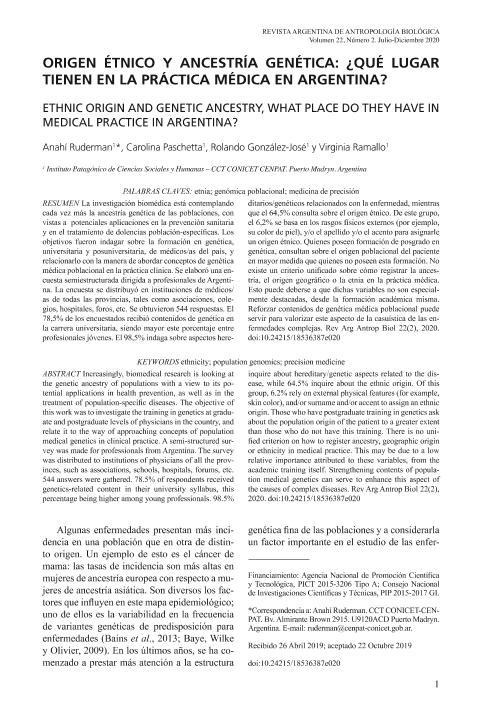Mostrar el registro sencillo del ítem
dc.contributor.author
Ruderman, Anahí

dc.contributor.author
Paschetta, Carolina Andrea

dc.contributor.author
Gonzalez-Jose, Rolando

dc.contributor.author
Ramallo, Virginia

dc.date.available
2021-03-16T17:49:09Z
dc.date.issued
2020-07
dc.identifier.citation
Ruderman, Anahí; Paschetta, Carolina Andrea; Gonzalez-Jose, Rolando; Ramallo, Virginia; Origen étnico y ancestría genética, ¿qué lugar tienen en la práctica médica en Argentina?; Universidad Nacional de La Plata. Asociación Antropología Biológica Argentina; Revista Argentina de Antropologia Biologica; 22; 2; 7-2020; 1-9
dc.identifier.issn
1853-6387
dc.identifier.uri
http://hdl.handle.net/11336/128393
dc.description.abstract
La investigación biomédica está contemplando cada vez más la ancestría genética de las poblaciones, con vistas a potenciales aplicaciones en la prevención sanitaria y en el tratamiento de dolencias población-específicas. Los objetivos fueron indagar sobre la formación en genética, universitaria y posuniversitaria, de médicos/as del país, y relacionarlo con la manera de abordar conceptos de genética médica poblacional en la práctica clínica. Se elaboró una encuesta semiestructurada dirigida a profesionales de Argentina. La encuesta se distribuyó en instituciones de médicos/ as de todas las provincias, tales como asociaciones, colegios, hospitales, foros, etc. Se obtuvieron 544 respuestas. El 78,5% de los encuestados recibió contenidos de genética en la carrera universitaria, siendo mayor este porcentaje entre profesionales jóvenes. El 98,5% indaga sobre aspectos hereditarios/genéticos relacionados con la enfermedad, mientras que el 64,5% consulta sobre el origen étnico. De este grupo, el 6,2% se basa en los rasgos físicos externos (por ejemplo, su color de piel), y/o el apellido y/o el acento para asignarle un origen étnico. Quienes poseen formación de posgrado en genética, consultan sobre el origen poblacional del paciente en mayor medida que quienes no poseen esta formación. No existe un criterio unificado sobre cómo registrar la ancestría, el origen geográfico o la etnia en la práctica médica. Esto puede deberse a que dichas variables no son especialmente destacadas, desde la formación académica misma. Reforzar contenidos de genética médica poblacional puede servir para valorizar este aspecto de la casuística de las enfermedades complejas.
dc.description.abstract
Increasingly, biomedical research is looking at the genetic ancestry of populations with a view to its potential applications in health prevention, as well as in the treatment of population-specific diseases. The objective of this work was to investigate the training in genetics at graduate and postgraduate levels of physicians in the country, and relate it to the way of approaching concepts of population medical genetics in clinical practice. A semi-structured survey was made for professionals from Argentina. The survey was distributed to institutions of physicians of all the provinces, such as associations, schools, hospitals, forums, etc. 544 answers were gathered. 78.5% of respondents received genetics-related content in their university syllabus, this percentage being higher among young professionals. 98.5% inquire about hereditary/genetic aspects related to the disease, while 64.5% inquire about the ethnic origin. Of this group, 6.2% rely on external physical features (for example, skin color), and/or surname and/or accent to assign an ethnic origin. Those who have postgraduate training in genetics ask about the population origin of the patient to a greater extent than those who do not have this training. There is no unified criterion on how to register ancestry, geographic origin or ethnicity in medical practice. This may be due to a low relative importance attributed to these variables, from the academic training itself. Strengthening contents of population medical genetics can serve to enhance this aspect of the causes of complex diseases.
dc.format
application/pdf
dc.language.iso
spa
dc.publisher
Universidad Nacional de La Plata. Asociación Antropología Biológica Argentina
dc.rights
info:eu-repo/semantics/openAccess
dc.rights.uri
https://creativecommons.org/licenses/by-nc-sa/2.5/ar/
dc.subject
ETHNICITY
dc.subject
POPULATION GENOMICS
dc.subject
PRECISION MEDICINE
dc.subject.classification
Otras Humanidades

dc.subject.classification
Otras Humanidades

dc.subject.classification
HUMANIDADES

dc.title
Origen étnico y ancestría genética, ¿qué lugar tienen en la práctica médica en Argentina?
dc.title
Ethnic origin and genetic ancestry, what place do they have in medical practice in Argentina?
dc.type
info:eu-repo/semantics/article
dc.type
info:ar-repo/semantics/artículo
dc.type
info:eu-repo/semantics/publishedVersion
dc.date.updated
2021-03-12T19:15:47Z
dc.journal.volume
22
dc.journal.number
2
dc.journal.pagination
1-9
dc.journal.pais
Argentina

dc.journal.ciudad
La Plata
dc.description.fil
Fil: Ruderman, Anahí. Consejo Nacional de Investigaciones Científicas y Técnicas. Centro Científico Tecnológico Conicet - Centro Nacional Patagónico. Instituto Patagónico de Ciencias Sociales y Humanas; Argentina
dc.description.fil
Fil: Paschetta, Carolina Andrea. Consejo Nacional de Investigaciones Científicas y Técnicas. Centro Científico Tecnológico Conicet - Centro Nacional Patagónico. Instituto Patagónico de Ciencias Sociales y Humanas; Argentina
dc.description.fil
Fil: Gonzalez-Jose, Rolando. Consejo Nacional de Investigaciones Científicas y Técnicas. Centro Científico Tecnológico Conicet - Centro Nacional Patagónico. Instituto Patagónico de Ciencias Sociales y Humanas; Argentina
dc.description.fil
Fil: Ramallo, Virginia. Consejo Nacional de Investigaciones Científicas y Técnicas. Centro Científico Tecnológico Conicet - Centro Nacional Patagónico. Instituto Patagónico de Ciencias Sociales y Humanas; Argentina
dc.journal.title
Revista Argentina de Antropologia Biologica
dc.relation.alternativeid
info:eu-repo/semantics/altIdentifier/doi/http://dx.doi.org/10.24215/18536387e020
Archivos asociados
